Chamber Event Highlights Fair Chance Hiring as Smart Talent Strategy
A Critical Strategy for Reducing Gun Violence and Expanding Opportunity
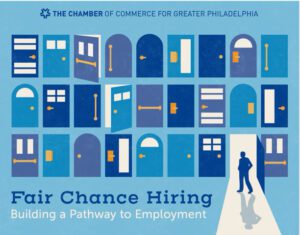
On March 25, 2025, the Chamber of Commerce for Greater Philadelphia brought together civic and business leaders at Girard College for a critical conversation on Fair Chance Hiring—an increasingly essential workforce strategy that also serves as a cornerstone of gun violence intervention efforts in Philadelphia. Individuals returning from incarceration or living with a criminal record are often at the highest risk of becoming involved in gun-related violence and face enormous barriers to employment. Yet stable, family-sustaining jobs are among the most effective forms of intervention to reduce gun violence, opening doors to careers, stability, and safer communities. A 2022 national report and a 2018 Philadelphia Reentry Coalition study confirm that lack of employment increases the risk of rearrest or reincarceration—especially in the first year after release.
The event featured a panel of forward-thinking employers and workforce leaders who are actively transforming their hiring practices to be more inclusive and equitable.
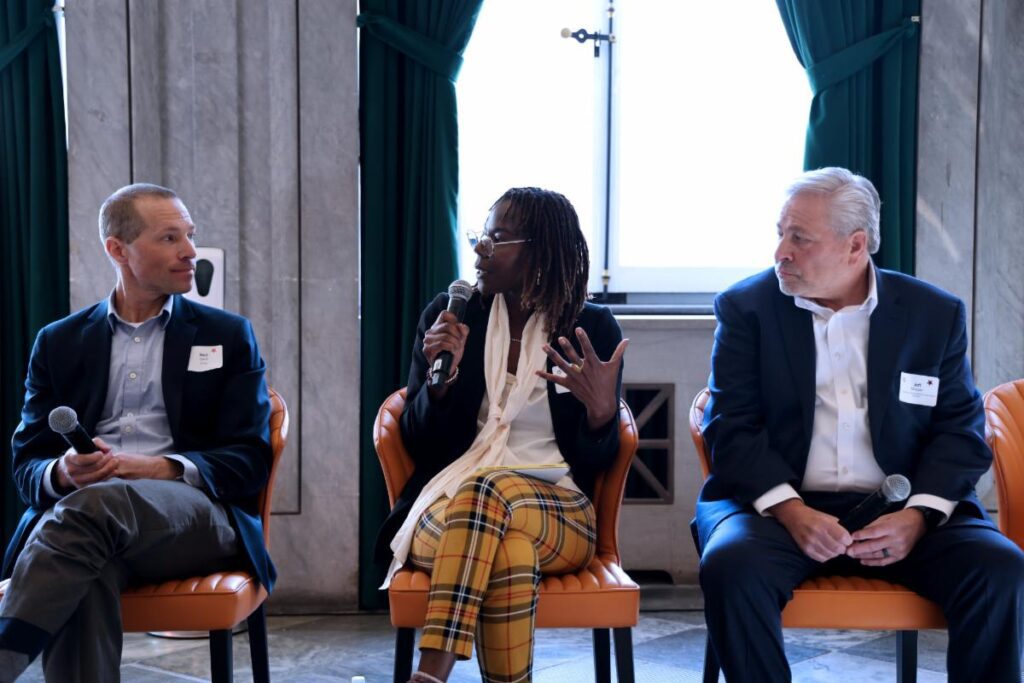
- Jeff Abramowitz, CEO of the Petey Greene Program, Petey Greene Program that supports the academic and career goals of incarcerated and formerly incarcerated people, framed the urgency of fair chance hiring within the broader context of mass incarceration in the United States, which has the highest incarceration rate in the world. In Philadelphia alone, an estimated 400,000 people have a criminal record, and the unemployment rate for formerly incarcerated individuals remains at a staggering 27%. Abramowitz emphasized that addressing this crisis requires a dual focus on education and careers.
- Jac Rivers, Vice President and Program Officer at JPMorgan Chase, emphasized that individuals with criminal records—many of whom were never incarcerated—represent a broad and diverse population that employers should take the time to understand. Citing that one in three Americans holding a criminal record, JPMorgan Chase has made a long-term commitment to inclusive hiring, employing between 3,000 and 5,000 individuals with records each year. In addition to its hiring efforts, the company invests in workforce development, skills training, and upskilling programs to help close opportunity gaps. As a founding member of the Second Chance Business Coalition, JPMorgan Chase also works to support other employers exploring fair chance hiring by helping them shift from traditional resume-based evaluation to a more equitable, skills-based approach. Rivers noted that a major challenge remains the lack of sustainable, living-wage jobs for justice-impacted individuals—a gap the company is actively working to help fill.
- Jeff Missan is director of recruitment and talent for SEPTA and shared how it overhauled hiring practices seven years ago, leading to a current system in which 80% of applicants—including those with criminal records—are hired, with a focus on building long-term careers. With over 800 open positions, SEPTA is actively seeking candidates ready to grow with the organization.
- Matt Joyce, a partner at Envoy, works with employers to rewrite HR policies and implement fair chance hiring goals, helping companies shift their mindset to view individuals with criminal records as untapped talent and valuable contributors to the workforce. Joyce urges employers to “create green lights” in their HR policies—making space for nuance and recognizing the strength and potential in applicants too often overlooked. One company engaged with Joyce changed their hiring policy from not hiring anyone with a criminal record or conviction to changing applicant eligibility to accept those who are 3-7 years removed from criminal justice involvement.
Q&A Takeaways: What Employers Should Know
- Anticipate Unintended Consequences of “Ban the Box”
Philadelphia’s Ban the Box policy has helped level the playing field—but without clear follow-up policies, candidates may start jobs only to be dismissed when background checks are reviewed later. Employers were urged to evaluate conviction relevance before making final decisions and ensure transparency with applicants.
- Use a Matrix of “Green Lights”
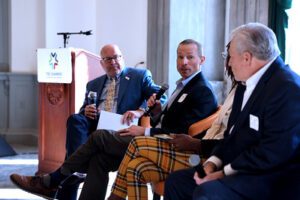
Matt Joyce advised creating decision matrices to identify offenses that are not relevant to certain positions. “If it doesn’t relate to the job—push the candidate through.”
- Encourage Voluntary Disclosure
Jeff Missan recommended building in a step between the conditional offer and background check that allows candidates to disclose and explain any history—giving HR teams context before judgment is made.
- Don’t Let Anecdotal Fears Drive Policy
Joyce reminded the audience that most fears about “what could go wrong” are based on rare anecdotes—not data. “Stay focused on facts, not fears.”
- Build Support Systems, Not Just Policies
Jac Rivers emphasized that reentry candidates often need more than a job—they need housing, transportation, and wraparound support. Employers are encouraged to partner with reentry organizations to help fill those gaps.
- Loud Voices Needed
The panel called on employers already doing this work to speak up. “We need champions in the business community who are willing to say, ‘We’ve done this, and it works.’”
The Coalition’s Commitment to Expanding Economic Opportunities for Intervention-based Groups
In partnership with local employers, workforce organizations, and community-based reentry programs, the Coalition is prioritizing the development of job training and employment pipelines for high-risk individuals actively participating in evidence-based intervention programs.
With prior convictions plus lack of formal work experience or professional skills needed to immediately adapt to traditional workplace environments, most of the population at highest risk also face steepest barriers to employment. Further complicating their access to good-paying jobs and career-building opportunities are the unintended consequences of Philadelphia’s Ban the Box policy, designed to provide individuals with criminal records a fair opportunity in the employment process. Enacted in 2011 and subsequently amended, the law prohibits employers from inquiring about an applicant’s criminal history on job applications or during initial interviews.. While the policy has created important opportunities by delaying background checks until after a conditional offer, it can also result in some individuals being hired and begin working, only to be let go once their record is revealed—disrupting progress and undermining intervention strategies aimed at reducing gun violence. If you’re an employer, HR leader, or workforce development partner interested in working with the very high-risk population, please contact David Brown via email at dbrown@savephillylives.org.
Local Trauma Surgeons Are Bracing For A Return To Rates Of Gun Violence Witnessed Five Years Ago
In a sobering opinion piece published in The Philadelphia Inquirer, local trauma surgeons affiliated with Civic Coalition to Save Lives partner organizations and grant recipients, sounded the alarm on a growing threat to the progress the city has made in reducing gun violence. Recent cuts, freezes and communication blackouts at the National Institutes of Health and Center for Disease Control risk halting and reversing the momentum built since the unprecedented surge in gun deaths in 2020.
The piece titled is co-authored by Dr. Elinore Kaufman, Medical Director of the Penn Violence, Dr. Jessica Beard, a trauma surgeon at Temple University Hospital, Stoneleigh Foundation fellow, and the director of research for the Philadelphia Center for Gun Violence Reporting.
We face new attacks on research — with communication blackouts, funding freezes, and cuts at the NIH — that threaten to halt the progress we’ve made since 2020. – Dr. Jessica Beard and Dr. Elinore Kaufman
Since its founding, the Civic Coalition to Save Lives has championed a sustainable public-private partnership model built on proven, data-driven intervention-based strategies to reduce gun violence. Yet, as the authors note, too many cities that drove down gun violence through intervention, have seen a swift reversal when political will or funding faded.
As the co-authors write, research reveals not just how gun violence happens, but why—providing insight that leads to solutions. Solutions like the local and city-led intervention-based programs and services in Philadelphia that focus on reaching the very highest risk individuals, to immediately stop cycles of violence and connect people to specific care, support and resources they need to build safer and healthier lives, families and communities. Read the full op-ed here.
Community Drivers
Interrupting Violence, Empowering Change: Philadelphia CeaseFire’s Lifesaving Work
Philadelphia CeaseFire has worked on the front lines of the city’s gun violence crisis for more than a decade, helping de-escalate conflict and guide high-risk individuals toward safer, more stable paths.
With the support of the Robert Wood Johnson Foundation, Chicago CeaseFire now known as Cure Violence developed a public health approach to violent crime that was proven effective in the reduction of homicides and shootings. The Center for Minority Health and Health Disparities based at Temple University’s Katz School of Medicine embraced this method and became the Commonwealth of Pennsylvania’s first Cure Violence replication site focusing its efforts in the 22nd police district in North Philadelphia.
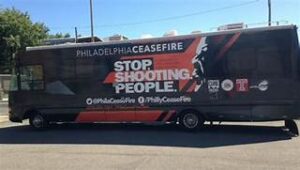
Based on the national Cure Violence model, the program treats gun violence as a contagious disease, something that outreach workers can interrupt, treat, and ultimately prevent through targeted community intervention. In 2017, an impact evaluation of the program funded by the US Dept. of Justices reported a 30% reduction in shootings within the program’s target areas.
CeaseFire then expanded its work to Mastery Gratz High School and partnered with Healing Hurt People at Drexel School of Public Health to provide support to those impacted by violent crime within the hospital setting.
At the heart of Philadelphia CeaseFire’s work, a team of experienced violence interrupters and outreach workers build trust with individuals at the highest risk of being involved in gun violence. They mediate conflicts before they escalate and help participants access job training, education, housing and other critical services.
“We’re not just responding to gun violence—we’re getting ahead of it,” said Marla Davis Bellamy, director of Philadelphia CeaseFire. “Our team members come from the communities they serve, and they use their lived experience to stop violence before it happens. This is grassroots public safety in action.”

CeaseFire’s strategy centers on five core components that work together to reduce violence and promote long-term change. Through community mobilization, staff engage residents, businesses, faith leaders and service organizations to build grassroots momentum and raise awareness. The youth outreach team connects directly with high-risk youth and helps redirect them toward job training, education, and other positive opportunities. CeaseFire’s robust public education campaign uses community-based messaging to initiate conversations, raise awareness, and promote safer responses to conflict. Leadership involvement, particularly from faith leaders and other trusted community figures, provides visible support and stability in the wake of violence. Finally, law enforcement participation adds the justice system, fostering accountability and helping rebuild trust between residents and public safety agencies.
The program has also begun providing victim services assistance to individuals impacted by violent crime with special emphasis placed on the disabled, LGBTQ hate crime victims and black men.
Philadelphia CeaseFire has also replicated the Chelsea HUB a law enforcement program and convenes a weekly meeting with over 30 local organizations and city agencies who work collaboratively to address the immediate needs of individuals, families and communities in crisis.
With support from the Civic Coalition to Save Lives, Philadelphia CeaseFire expanded its work to Chester, PA and formed its Stronger Together initiative. The program engages local community based organizations and provides participants with wraparound services such as meals, professional clothing for job interviews, listening sessions with private-sector leaders and this year will provide behavioral health counseling sessions along with weightlifting and personal training.
“Philadelphia CeaseFire, in its 14 years of operation, has learned the importance of intervention,” said Davis Bellamy. “We believe people can change—and when they are given the right tools and trusted guidance, they do. It is not easy work, but it’s lifesaving. And it is working.”
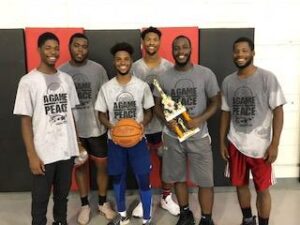
As part of the city’s growing network of intervention programs, Philadelphia CeaseFire collaborates with partners across public safety, health care and community sectors. Together, these efforts aim to shift the culture of violence through coordinated outreach and real-time support.
“We see the transformation that happens when people receive the right tools and build trusting relationships,” Davis Bellamy said. “It’s not just about stopping violence—it’s about creating pathways to healing, stability and hope.”
Through outreach, education, mediation and mentorship, Philadelphia CeaseFire proves that when the right people deliver the right message at the right time, lives change—and communities heal.
To learn more about Philadelphia CeaseFire, visit philaceasefire.com.
Partner Spotlight
Black Men Heal #ShareOurStories Campaign
Civic Coalition to Save Lives’ partner Black Men Heal has continued its #ShareOurStories (#SOS) campaign to raise awareness and normalize conversations about mental health in the Black community.
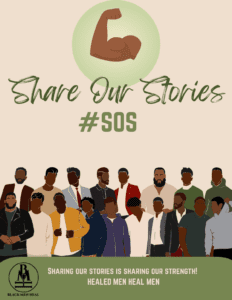
Black Men Heal is a nonprofit organization dedicated to eliminating the barriers that prevent Black men from accessing mental health care. Through free therapy sessions, peer support, and storytelling, they create safe spaces for healing, self-discovery, and emotional wellness.
The #SOS campaign encourages men to share their mental health journeys—highlighting both challenges and triumphs—while raising $50,000 to expand free mental health services. For more information about the campaign, links to contribute and a short video featuring participants sharing their stories visit the Black Men Heal #ShareOurStories webpage.
EMIR Healing Center Honors 28 Years of Healing
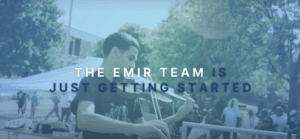
To mark the 28th anniversary of Emir Greene’s death, EMIR Healing Center—a community-based partner of the Civic Coalition to Save Lives—released this moving video tribute honoring the man whose death inspired the organization’s founding and those it serves. The family of Emir Greene founded the EMIR (Every Murder Is Real) Healing Center to provide healing, support, and community-led intervention for those most impacted by gun violence in Philadelphia.
ICYMI
CIVIC COALITION TO SAVE LIVES IN THE NEWS
As Executive Director of the Civic Coalition to Save Lives and Assistant Dean at Temple University’s Klein College of Media and Communication, David Brown is not only helping to lead efforts to reduce gun violence, he’s educating a new generation of changemakers and bringing moral clarity to Philadelphia’s most significant challenge. David discussed the intersection of his roles as executive director, professor and pastor and his values-centered approach to leadership with Dr. Eric John Nzeribe, the publisher of FunTimes Magazine, a media, marketing, and community engagement platform dedicated to amplifying the voices of the African Diaspora and Black communities.
You can also listen to the Funtimes Exchange podcast for more information about David Brown’s work and scholarship.